c-Myc overexpression uncouples DNA replication from mitosis
- PMID: 10409725
- PMCID: PMC84377
- DOI: 10.1128/MCB.19.8.5339
c-Myc overexpression uncouples DNA replication from mitosis
Abstract
c-myc has been shown to regulate G(1)/S transition, but a role for c-myc in other phases of the cell cycle has not been identified. Exposure of cells to colcemid activates the mitotic spindle checkpoint and arrests cells transiently in metaphase. After prolonged colcemid exposure, the cells withdraw from mitosis and enter a G(1)-like state. In contrast to cells in G(1), colcemid-arrested cells have decreased G(1) cyclin-dependent kinase activity and show hypophosphorylation of the retinoblastoma protein. We have found that overexpression of c-myc causes colcemid-treated human and rodent cells to become either apoptotic or polyploid by replicating DNA without chromosomal segregation. Although c-myc-induced polyploidy is not inhibited by wild-type p53 in immortalized murine fibroblasts, overexpression of c-myc in primary fibroblasts resulted in massive apoptosis of colcemid-treated cells. We surmise that additional genes are altered in immortalized cells to suppress the apoptotic pathway and allow c-myc-overexpressing cells to progress forward in the presence of colcemid. Our results also suggest that c-myc induces DNA rereplication in this G(1)-like state by activating CDK2 activity. These observations indicate that activation of c-myc may contribute to the genomic instability commonly found in human cancers.
Figures
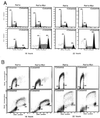

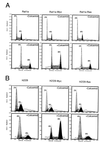
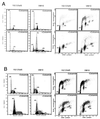

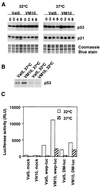

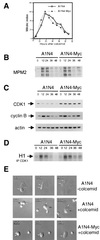


Similar articles
-
DNA rereplication in the presence of mitotic spindle inhibitors in human and mouse fibroblasts lacking either p53 or pRb function.Cancer Res. 1997 Mar 15;57(6):1013-9. Cancer Res. 1997. PMID: 9067261
-
Expression of apoptosis and cell cycle related genes in proliferating and colcemid arrested cells of divergent lineage.Cell Mol Biol (Noisy-le-grand). 2000 Feb;46(1):79-88. Cell Mol Biol (Noisy-le-grand). 2000. PMID: 10726974
-
Activation of c-Myc uncouples DNA replication from activation of G1-cyclin-dependent kinases.Oncogene. 1997 Aug 7;15(6):649-56. doi: 10.1038/sj.onc.1201236. Oncogene. 1997. PMID: 9264405
-
Therapeutic opportunities to control tumor cell cycles.Clin Transl Oncol. 2006 Jun;8(6):399-408. doi: 10.1007/s12094-006-0193-7. Clin Transl Oncol. 2006. PMID: 16790392 Review.
-
The functions of Myc in cell cycle progression and apoptosis.Prog Cell Cycle Res. 1996;2:73-82. doi: 10.1007/978-1-4615-5873-6_7. Prog Cell Cycle Res. 1996. PMID: 9552384 Review.
Cited by
-
Aurora kinases A and B are up-regulated by Myc and are essential for maintenance of the malignant state.Blood. 2010 Sep 2;116(9):1498-505. doi: 10.1182/blood-2009-11-251074. Epub 2010 Jun 2. Blood. 2010. PMID: 20519624 Free PMC article.
-
Global regulation of genome duplication in eukaryotes: an overview from the epifluorescence microscope.Chromosoma. 2008 Jun;117(3):243-60. doi: 10.1007/s00412-007-0145-1. Epub 2008 Jan 16. Chromosoma. 2008. PMID: 18197411 Review.
-
Polycomb proteins control proliferation and transformation independently of cell cycle checkpoints by regulating DNA replication.Nat Commun. 2014 Apr 14;5:3649. doi: 10.1038/ncomms4649. Nat Commun. 2014. PMID: 24728135 Free PMC article.
-
MicroRNAs Targeting MYC Expression: Trace of Hope for Pancreatic Cancer Therapy. A Systematic Review.Cancer Manag Res. 2020 Apr 1;12:2393-2404. doi: 10.2147/CMAR.S245872. eCollection 2020. Cancer Manag Res. 2020. PMID: 32308478 Free PMC article. Review.
-
c-MYC-induced genomic instability.Cold Spring Harb Perspect Med. 2014 Apr 1;4(4):a014373. doi: 10.1101/cshperspect.a014373. Cold Spring Harb Perspect Med. 2014. PMID: 24692190 Free PMC article. Review.
References
-
- Amati B, Alevizopoulos K, Vlach J. Myc and the cell cycle. Front Biosci. 1998;3:250–268. - PubMed
-
- Barr L F, Campbell S E, Penno M B, Ball D W, Baylin S B. Cell-substratum interactions mediate oncogene-induced phenotype of lung cancer cells. Cell Growth Differ. 1996;7:1149–1156. - PubMed
-
- Berns K, Hijmans E M, Bernards R. Repression of c-Myc responsive genes in cycling cells causes G1 arrest through reduction of cyclin E/CDK2 kinase activity. Oncogene. 1997;15:1347–1356. - PubMed
Publication types
MeSH terms
Substances
Grants and funding
LinkOut - more resources
Full Text Sources
Research Materials
Miscellaneous
